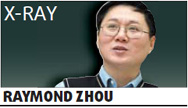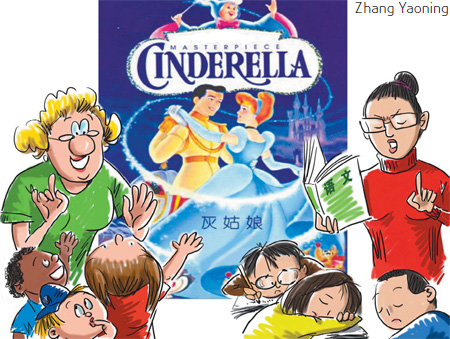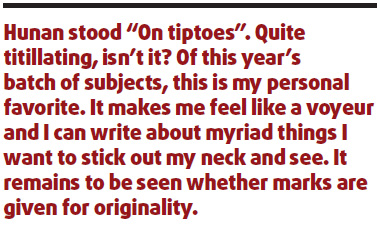
Last year, I received an e-mail story from a friend. She often sends me interesting postings with bi-cultural significance.
This one was about the difference between the Chinese and American ways of teaching the Cinderella story. Here it goes:
In an American school, the teacher asks her students: What if Cinderella does not leave the ball at midnight? And they answer: She will resume her dirty look. So the teacher concludes, it shows the importance of being punctual and looking your best.

She then follows up with a new perspective: Would the students do the same thing had they been her cruel stepmother? They hesitate, but say yes. The stepmother, suggests the teacher, is not totally evil. She loves her own children and her failing is her inability to love others.
The teacher then probes what makes Cinderella resolve to go to the ball despite her stepmother's objections. It's the fairy godmother who offers help, say the students. That shows, continues the teacher, that everyone needs help from friends. The more friends you have, the better you'll cope with future problems.
She further examines Cinderella's decision to go to the ball. Even if nobody had objected, she would not have bothered if she had not wanted to go, so her determination was crucial. When you feel others don't love you, you should love yourself, and when others don't give you opportunities, give yourself more opportunities.
The students finally examined possible loopholes in the fairytale and discussed how, although everything changed back at midnight, one of Cinderella's slippers did not, which seemed to go against the moral of the story. They were praised for having a sharp eye.
Now, the Chinese methodology:
Teacher: Did you all preview this text?
Student: This is an old wives' tale. Everyone knows it. Who needs to prepare for it?
Teacher: Who is the author? Is it Grimms or Andersen? And do you know the life story of the author?
Student: We have eyes and the answer is printed in the text.
Teacher: What's the significance of this story?
Student: It sounds so serious it looks like we are going to be tested later on.
Teacher: Now, let's get to the text. Who can divide it into sections?
Student: The beginning, the middle, and the last section, as usual.
Teacher: Now, about this sentence, is it a simile or a metaphor?
Several students start to doze off.

Teacher: If I change this particular word, it won't be as good as the one in the text? Why did the author have that word choice?
More students doze off.
Teacher: Can we change the place of these two sentences? And why not?
Most students fall asleep.
Teacher: Now, if you don't listen in class, you cannot get high scores; and without high scores you cannot get into colleges; and without college, you can't... This is the way of life.
End of story.
When I did research on this parallel parable, which I feel is more illustrative than tomes of academic thesis on the same topic, I found, to my surprise, it has been copied and pasted to numerous Chinese websites. Although nobody seems to be aware of the origin or authorship, there's a consensus it is a fairly accurate depiction of the rigid and pathetic way language and literature are taught in Chinese schools.
Simply put, the American pedagogy emphasizes discussion, enlightenment and multiple perspectives while the Chinese approach is all about theory and cramming.
But obviously Chinese teachers have realized they cannot go on with this. The latest evidence of change came a few days ago at the annual college entrance examination. For the writing part, the topics were no longer limited to "epiphanies from a small incident", such as stumbling upon a wallet in the road or planting a tree on environmental protection day.
What could you possibly postulate from these clues? Pocket the cash and throw the wallet into the garbage can? No way. You'd have to say:
"My parents are poor and I don't have money to buy fancy stuff, but after a few minutes of 'inner struggle' (yes, that's the phrase favored by teachers) I turned it to the police, who in turn found out who lost it. The grateful owner thanked me, making me feel good and like the good soldier Lei Feng for a whole day."
As for the essay on tree planting, you'd have to exhume your inner Al Gore and wax lyrical about a world covered with trees. It doesn't matter if your whole family is into partaking the meat of pangolin, an animal that feeds on termites that destroy rainforests. You must be politically correct when you write essays, period.
But surprise, surprise! This year's exam offers a rich array of open-ended topics for students' essays. The one in Hubei is titled "On the doorstep of " Fujian has "This is also a kind of " Shandong's is "Witness". Sichuan tested on "Familiarity". Those in Guangdong wrote about "Common sense". Chongqing had "Story and I".
Hunan stood "On tiptoes". Quite titillating, isn't it? Of this year's batch of subjects, this is my personal favorite. It makes me feel like a voyeur and I can write about myriad things I want to stick out my neck and see. It remains to be seen whether marks are given for originality.
It's hard to score this kind of essays. No matter how many scenarios you prepare beforehand, students can come up with unexpected things. That requires graders to have an open mind for unconventional ideas with a glint of genius.
Controversy is no longer taboo. Many of this year's topics are plucked from hot news items. Jiangxi asked students for their take on the auction of the looted Yuanmingyuan artifacts. Liaoning zeroed in on the phenomenon of celebrities endorsing products found to be faulty.
It seems like graders are finally not settling for conformity. Instead they are looking to see how students make their points and make them convincing. But conformity is ingrained in us. Thousands of years of Confucius doctrine is not designed to let us ask questions, but to think along the lines of authority figures. Once we are given the freedom, albeit limited, many are confounded.
Reactions toward this year's topic selections range from "too generic" to "too close to current affairs". Granted, there should be a balance between the general and the specific. And it varies with each student. It'll always favor one group over another. And this year's weighed in favor of urbanites, who enjoy more access than rural kids to news, information and social commentary.
In the end, everything depends on how the essays are graded. I remember a few years ago some really imaginative ones got the lowest score - when I say low, I mean zero! That's far less likely now but a new problem will arise. You can break the mould and set a new standard but pretty soon, that will also become the new formula by which imitators churn out millions of similar essays. Kind of like all the other knock-off product lines.
The problem is not with the material the children are given as much as the way they are allowed to use it. At the end of the day, innovation must be encouraged. That's probably the only foolproof answer.

